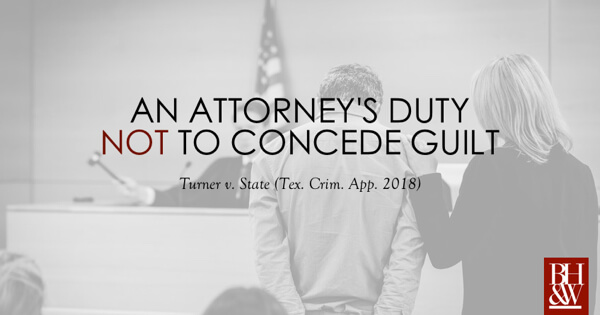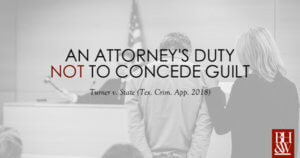
 The Court of Criminal Appeals recently handed down an opinion regarding an attorney’s obligation not to concede their client’s guilt. The issue before the Court was whether the defendant was entitled to a new trial on direct appeal because his defense counsel conceded his guilt at trial against his wishes.
The Court of Criminal Appeals recently handed down an opinion regarding an attorney’s obligation not to concede their client’s guilt. The issue before the Court was whether the defendant was entitled to a new trial on direct appeal because his defense counsel conceded his guilt at trial against his wishes.
Turner v. State—Court of Criminal Appeals (2018)
The Facts—Defense Counsel Conceded Client’s Guilt Against His Wishes.
In the underlying case, defense counsel was appointed to represent Defendant for capital murder. Defendant had been charged with killing his wife and mother-in-law. Based on overwhelming evidence against Defendant, counsel insisted he admit his guilt and concentrate on obtaining a life sentence in order to avoid the death penalty. Defendant, however, did not want to admit guilt and made it readily apparent to counsel. Defendant also disputed counsel’s mitigation investigation in regard to his trial. Counsel responded to this claim by stating that Defendant did not have a voice in the matter that would override their voice or their tactics. Counsel further stated that Defendant was only allowed to decide whether to plea and whether to testify.
Against Defendant’s wishes, counsel told the jury in opening statements that the evidence would show Defendant killed his wife in a jealous rage, and it would also show that the grandma’s death was accidental. Counsel further told the jury that the facts of the case did not support the offense of capital murder, that Defendant was in denial about having committed the crime, and that the proper verdict was the lesser-included offense of murder. Defendant, however, maintained his innocence throughout trial and denied any involvement in the murders.
Even after Defendant testified to his innocence, counsel still conceded that Defendant was guilty in closing arguments. Defendant was subsequently found guilty of capital murder and sentenced to death. On direct appeal, the Court of Criminal Appeals looked to a recent United States Supreme Court decision, McCoy v. Louisiana, to assess its impact.
McCoy v. Louisiana—Supreme Court Holds the Sixth Amendment Guarantees a Defendant “the Right to Insist that Counsel Refrain from Admitting Guilt.”
Recently, the United States Supreme Court addressed the issue of an attorney conceding their client’s guilt without their consent. In McCoy, the defendant was charged with first-degree murder, and the State was seeking the death penalty. Based on overwhelming evidence in that case, defense counsel advised the defendant he planned to concede guilt to avoid the death penalty. The defendant was irate and told his attorney “not to make that concession.” Against these demands, defense counsel conceded guilt in opening statements. Even so, the defendant maintained his innocence throughout trial.
On appeal, the Supreme Court held that the Sixth Amendment guarantees to a defendant “the right to insist that counsel refrain from admitting guilt, even when counsel’s experience-based view is that confessing guilt offers the defendant the best chance to avoid the death penalty.” The Court further stated, “When a client expressly asserts that the objective of ‘his defense’ is to maintain innocence of the charged criminal acts, his lawyer must abide by that objective and may not override it by conceding guilt.” The Court explained that a defendant’s choice to maintain his innocence is an “objective of representation, not merely an issue of trial tactics.” As such, the decision is one for the client, not the attorney.
With this decision, the Supreme Court concluded that the error was structural in nature and, therefore, required an automatic reversal. The Court explained that the issue was not one of ineffective-assistance-of-counsel because the issue was concerning “a client’s autonomy, not counsel’s competence.”
Court of Criminal Appeals Reverses and Remands Case—Finding Counsel Committed a McCoy Violation by Conceding Guilt Against the Defendant’s Wishes.
In reviewing McCoy, the Court of Criminal Appeal held it was applicable. The State, however, argued that the defendant failed to timely object and preserve the record in order to show a McCoy violation. The Court disagreed with the State by explaining that a defendant should not be expected to object with the precision of an attorney. Rather a defendant can make a McCoy claim by presenting expressing his innocence.
Here, there was no question that the defendant wanted to maintain his innocence. During his testimony, he stated so explicitly. And, despite the defendant’s testimony disagreeing with counsel’s strategy, they continued to concede guilt in closing arguments. Further, as stated above, counsel believed the only decisions Defendant was entitled to make were “whether to plea and to testify.” Thus, solidifying the Court’s conclusion that counsel knew they were acting against Defendant’s wishes. And, moreover, that they believed they were not required to follow his wishes.
Based on the above facts, the Court determined that the defendant adequately preserved his McCoy claim and there was in fact a violation. And, even though counsel’s strategy to concede guilt was more rational than Defendant’s theory, whether to concede guilt is one of the few rights that the defendant alone must determine under the Sixth Amendment. It’s a decision reserved for the client, not the attorney. As a result, the Court reversed and remanded for a new trial.







